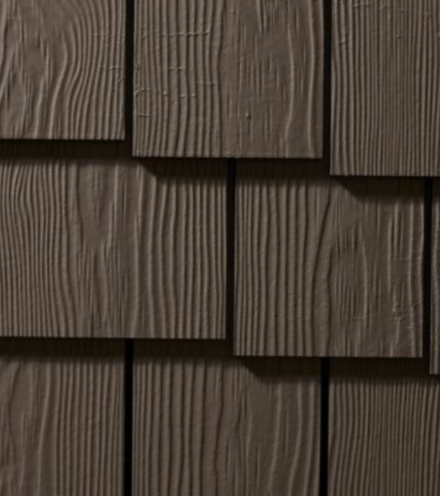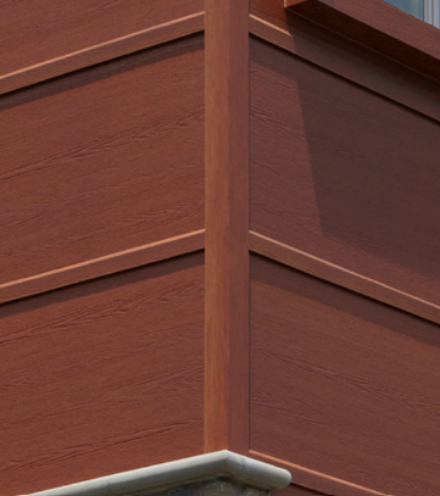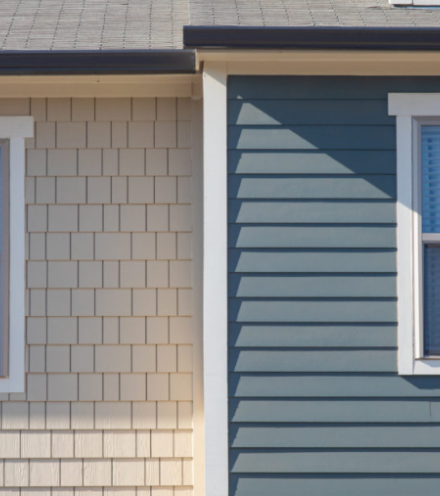What is the Best Siding for Noise Reduction?
Unless you live in the middle of nowhere, there's a chance you're hearing a noise outside your home right now. Whether it's traffic passing by, thunder or even your neighbors chatting, there are times when noise is just not welcomed. These unwanted noises happen every day and could even affect your sleeping habits. Homeowners often ask, "what is the best way to insulate siding for noise reduction?"
Fortunately, some of the best sidings for noise reduction are out on the market, and this could be a great way to upgrade your home. So, let's explore the best exterior siding for noise reduction so you can get some peace and quiet in your home.

How can siding replacement help reduce noise?
Not all siding is the same, as the noise level will vary. Usually, vinyl siding is considered a major go-to for homeowners who are looking to reduce outside noises. The style and thickness will all play determining factors for each type of material, and that includes vinyl. At the same time, it's not possible to entirely block out noise from outside; muffling the sound will at least work.
For instance, vinyl is ideal for muffling noises that are 4,000 hertz and below, while the stone is ideal for reducing sounds that are above 4,000 hertz. Plus, there are going to be other factors when deciding the best exterior siding for noise reduction. For example, the siding materials' thickness and weight will play a great role.
Best siding for noise reduction and soundproofing your home
All homes deserve to have tranquility and not be bothered by the sounds happening outside their home but to get this; you'll need to look out for the material of the siding. So, if you're wondering about the best way to insulate siding for noise reduction, here are a few to look out for.
Fiber cement siding
Known for its water resistance and fireproof, fiber cement siding is known for being one of the best siding types for noise reduction. It's made of cement, cellulose fibers, and a mixture of sand, making it very durable. The siding itself looks similar to wood, thanks to the grain, and it can be a great insulator against noise. However, it's not the best option if you're trying to create an energy-efficient home. It requires regular maintenance, such as repainting and caulking. Plus, if you're comparing it to other sidings, such as insulated vinyl, it only reduces the sound by about 4% more.
Vinyl siding
Vinyl is a major go-to for homeowners, especially its insulated vinyl siding counterpart. As stated above, vinyl siding is a great choice for muffling sounds with a 4,000 hertz or less frequency. In addition, it doesn't require nearly as much maintenance as fiber cement siding, and it comes in a lot of colors. Plus, if you're a DIYer looking to save money, you could install this siding yourself rather than hire a professional. In terms of choices, there are horizontal and vertical panels, beaded, shake, and lap designs.
Insulated vinyl siding
For a lot of homeowners, when they're looking for the best siding for noise reduction, they will usually go for insulated vinyl siding. This type of siding works best for reducing noises from 2,000 to 5,000 hertz. Plus, it's also able to reduce sound transmissions by 39%. In terms of the best siding foam for noise reduction, the foam is rigid and permanently adhered to the vinyl siding.
This means that you won't have to do two separate installations. Thanks to the foam within the siding, you can count on energy savings, a long-lasting appearance, and little maintenance, and it will help with impact resistance far better than traditional vinyl siding. This is eight to ten times more effective at reducing noise than fiber cement siding.
Wood siding
Wood is both heavy and dense, which is a great combination for softening sound. If you live in a noisy area and are not a vinyl siding fan, then wood siding could be your next best bet. Since wood is so porous, it's about to trap sound in its little air pockets. Plus, this looks natural, so if you want to focus on aesthetics, then wood siding is all the more attractive. However, there are some disadvantages, such as the lack of color options and the fact that installation comes with a hefty price tag.

Other ways that siding can impact noise reduction
While briefly mentioned earlier, some considerations need to be taken into account when deciding on the best siding for noise reduction that will suit your home. All siding isn't created equal; even the same material itself could still have some variations. So, when you're looking into other ways that siding can impact noise reduction, these are some points to keep in mind.
How the siding material can impact noise reduction
Nearly all siding types will muffle noises outside; you can count on that. But the level of noise you want to muffle or cancel out will vary based on the material itself for the siding. If you only want to muffle out some noise, any frequencies 4,000 Hz or lower (cars, for example), then vinyl and insulated vinyl siding will both be great options. However, organic material such as stone or wood would be the better option if you're looking to muffle out any noise in your home, especially outside noises that are 4,000 Hz (such as whistles or birds).
Thickness matters
The thickness of the siding is going to play great importance in noise reduction for your home. Therefore, you're going to want something that's both thick and heavy. Ideally, composite siding that's made from at least two materials is going to be best.
Don't forget about the weight
Just as thickness plays a major importance, so does the weight of the siding. Vinyl can be a great example of this; insulated vinyl siding is not only thicker than traditional vinyl siding but also heavier. This alone makes it a better choice than traditional vinyl. Organic materials, such as stone or wood, could also be a great example, as both of these are more effective than vinyl insulated siding.
Insulation
Last but certainly not least would be the insulation. Insulation is able to absorb vibrations, and this includes sound. So while the main purpose of insulation is to keep stable temperatures in the interior of the home, it can significantly impact the noise level that reaches inside the home too.

Other ways to reduce noise in your home
While choosing new siding for your home for noise reduction can be a great choice, this isn't the only option you have. There are other ways to soundproof your home; most of these can be fairly simple too. A great example would be your windows and your window treatments. If you install energy-efficient windows, you're immediately able to muffle more noise thanks to their thickness. It's similar for window treatments, too; if you buy thick blackout curtains, they will instantly muffle sound as well as block out any escaping air. If you're a fan of landscaping, then you could plant trees around your windows, as this could minimize sound transmission by 40%!

What would be the best siding for noise reduction?
Ultimately, it will depend on your preference and what noise frequency you're trying to block out. If you're living in a constantly loud area, organic materials such as wood will be the best option. But insulated vinyl siding may be the best option if you're trying to minimize noise, such as cars passing by. Just keep in mind that noise-reduction siding can work wonders, but it's still best to look at other options to help reduce noise.



